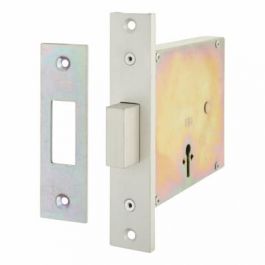AIUI the 3 phase gear is in an area about to be locked, or are you asking if there is any 3ph machinery?Out of interest, is the 3 phase in a public area? Or a staff only area?
You are using an out of date browser. It may not display this or other websites correctly.
You should upgrade or use an alternative browser.
You should upgrade or use an alternative browser.
Secure Meter Cupboard access?
- Thread starter skhudy
- Start date
Sponsored Links
- Joined
- 22 Jul 2016
- Messages
- 6,044
- Reaction score
- 1,125
- Country

Where is the cupboard? Can guests legally access the area?
I would expect that 3 phase equipment would be in staff only areas (which should still be protected)
I would expect that 3 phase equipment would be in staff only areas (which should still be protected)
What sort of protection are you anticitating? 3ph switch gear (Fuse boxes etc) require a tool for access but nothing more.Where is the cupboard? Can guests legally access the area?
I would expect that 3 phase equipment would be in staff only areas (which should still be protected)
I can think of a shop where the 3ph supply and several 3ph distribution boards are on the wall of the staff rest/lunch area and exactly the same sort of arrangement in a small factory. In a managed office building the 3ph electrics are in the reception area, sort of round the corner ish. So sort of staff only.
This thread is more about H&S and common than electrical regs.
What is this "It" to which you refer?It says tool or key, ....
Kind Regard, John
Sponsored Links
As I said,it's better than nothing, but obviously no significant impediment to someone who wants to open the door/whatever.Bear in mind the door is currently not secured and to date has not caused problems.
It is, and the key is also a device which is very widely available at minimal cost ..Such a lock is an extremely standard device on electrical cupboards and cabinets.
Yep, if one wants 'different shapes' (maybe to allow one to widen the scope of one's 'malicious activities'?As a contractor I find them (or similar but with different shapes) frequently being used for such a purpose. The big advantage of the three square is meter readers use them all day long.
Kind Regards, John
In what environments, and who/what says that?3ph switch gear (Fuse boxes etc) require a tool for access but nothing more.
Kind Regards, John
- Joined
- 27 Jan 2008
- Messages
- 25,365
- Reaction score
- 2,982
- Location
- Llanfair Caereinion, Nr Welshpool
- Country

It is repeated many times, one example
412.2.2.3 Where a lid or door in an insulating enclosure can be opened without the use of a tool or key, all
conductive parts which are accessible if the lid or door is open shall be behind an insulating barrier (providing a
degree of protection not less than IPXXB or IP2X) preventing persons from coming unintentionally into contact
with those conductive parts. This insulating barrier shall be removable only by the use of a tool or key.
That, and all regs like it, relate only to the opening of an enclosure which is preventing contact with 'live parts'.It is repeated many times, one example
412.2.2.3 Where a lid or door in an insulating enclosure can be opened without the use of a tool or key, all
conductive parts which are accessible if the lid or door is open shall be behind an insulating barrier (providing a
degree of protection not less than IPXXB or IP2X) preventing persons from coming unintentionally into contact
with those conductive parts. This insulating barrier shall be removable only by the use of a tool or key.
That's totally different from the situation (like the OP's) in which all live parts are adequately protected by enclosures and one is talking merely about access to (the outside of) those enclosures.
Kind Regards, John
Fit one of these , also gives access to emergency services who carry keys.
 www.ironmongerydirect.co.uk
www.ironmongerydirect.co.uk
Fire Brigade FB2 Mortice Deadlock - Case 103mm - 51mm Backset - Silver | IronmongeryDirect | Same Day Despatch
Fire Brigade FB2 Mortice Deadlock - Case 103mm - 51mm Backset - Silver available at great trade prices with easy and free returns. Order Mortice Locks & Latches before 8pm for same day despatch.
'Emergency access' is most likely to be needed before emergency services show their faces. In any event, as a 'security' measure it's not a lot better than the triangular thingies, given that the same site lists:Fit one of these , also gives access to emergency services who carry keys. ...
... and the likes of eBay have countless (in some cases cheaper) offers of the same:
Kind Regards, John
Don’t think many hotel guests will be carrying Fire Brigade keys or interested in cupboards with access from Fire Brigade keys.'Emergency access' is most likely to be needed before emergency services show their faces. In any event, as a 'security' measure it's not a lot better than the triangular thingies, given that the same site lists:
View attachment 277259
... and the likes of eBay have countless (in some cases cheaper) offers of the same:
View attachment 277260
Kind Regards, John
In the event of a fire you evacuate , you don’t run to isolate the power .
One reason these are fitted in many properties with multiple occupants ( blocks of flats etc).
Very true, but one of the concerns mentioned in the OP was potential access by a "malicious person", who might well not be hotel guest, and who could well become 'better equipped' than a hotel guest!Don’t think many hotel guests will be carrying Fire Brigade keys or interested in cupboards with access from Fire Brigade keys.
Again, very true - but there are plenty of 'emergency situations' which are not fires, and don't necessarily require evacuation or attendance by emergency services, but in which an immediate means of isolating the power (or gas or water) is needed.In the event of a fire you evacuate , you don’t run to isolate the power .
In my own home, I would personally be uncomfortable knowing that I would have to 'find a key' if I urgently needed to switch off the electricity (or gas or water) supplies - and I would have thought the same probably applies at least as much in non-domestic premises. At the very least, I would hope for a key in something like a 'break glass' enclosure (with an alarm) in close and conspicuous proximity to the door/whatever that was denying me immediate access to the controls I needed to get to.,
Kind Regards, John
Malicious person would just open the door as it’s currently not locked .
Better equipped ? Then they would not need a key.Find the key ? So you changes your mind you think the cupboard should remain unlocked .
Find your comments muddled and nonsensical .
Better equipped ? Then they would not need a key.Find the key ? So you changes your mind you think the cupboard should remain unlocked .
Find your comments muddled and nonsensical .
I don't know if it's widespread practice, or even a rule of some sort, but in several places I've worked in the past, meter cupboards, both gas and electric, have always been secured with FB2 (fire brigade) locks. I seem to recall that in one instance, UKPN insisted on it for an external power intake switchroom.
This approach might not cover you from the malicious entry point of view but it certainly should do from the safety point of view. Someone who has gone to the effort of obtaining the key and unlocking the door cannot be said to have entered by accident.

 www.e-hardware.co.uk
www.e-hardware.co.uk
This approach might not cover you from the malicious entry point of view but it certainly should do from the safety point of view. Someone who has gone to the effort of obtaining the key and unlocking the door cannot be said to have entered by accident.

Frelan Jedo Fire Brigade Locks
This fire brigade mortice lock is operated by common keys that are kept by emergency services such as the Fire brigade, ambulance service, police and should not be relied upon for security purposes. This Fire brigade lock is supplier without keys. Keys can be ordered separately. When purchasing...
Last edited:
I don't think you are doing enough 'reading between the lines' of my commentsFind your comments muddled and nonsensical .
I personally find the whole thing pretty nonsensical, as is not uncommonly the case with interpretations of "H&S" requirements. I'm not sure what sort of malicious activities and/or "malicious people' they have in mind, but they must be extremely rare and, as I've been pointing out, none of the measures that have been suggested would be a significant deterrent to someone with determined 'malicious intent'.
As for safety, as far as children are concerned, the door does not even need to be locked - simply having the 'door handle' high up (as in doors on children's wards in hospitals) would be adequate. In any event, for adults (and, really, also children), an 'electrical meter and consumer unit' in a small hotel should not represent any greater risk to anyone (adult or child) than do the meter and CU in any domestic dwelling, include those in which the 'guests being protected in the hotel' normally live.
As for 'muddled', then IF (despite the above) it really is believed that there is some need for 'security', then, particularly in a 'public' building, there is the usual inevitable conflict between considerations of 'safety' and 'security' - the more difficult one makes it for people to 'get at things' and/or to get in/out of a building (in the name of 'security', the more difficult does it inevitably become for them to do such things if needed 'in an emergency'. However, as above, I'm far from convinced that I really see any need (for either) in the situation being discussed, to the question may well be moot (as far as I am concerned)
Kind Regards', John
DIYnot Local
Staff member
If you need to find a tradesperson to get your job done, please try our local search below, or if you are doing it yourself you can find suppliers local to you.
Select the supplier or trade you require, enter your location to begin your search.
Please select a service and enter a location to continue...
Are you a trade or supplier? You can create your listing free at DIYnot Local
Sponsored Links
Similar threads
- Replies
- 304
- Views
- 25K
- Replies
- 11
- Views
- 2K
- Replies
- 16
- Views
- 13K
- Replies
- 4
- Views
- 5K
